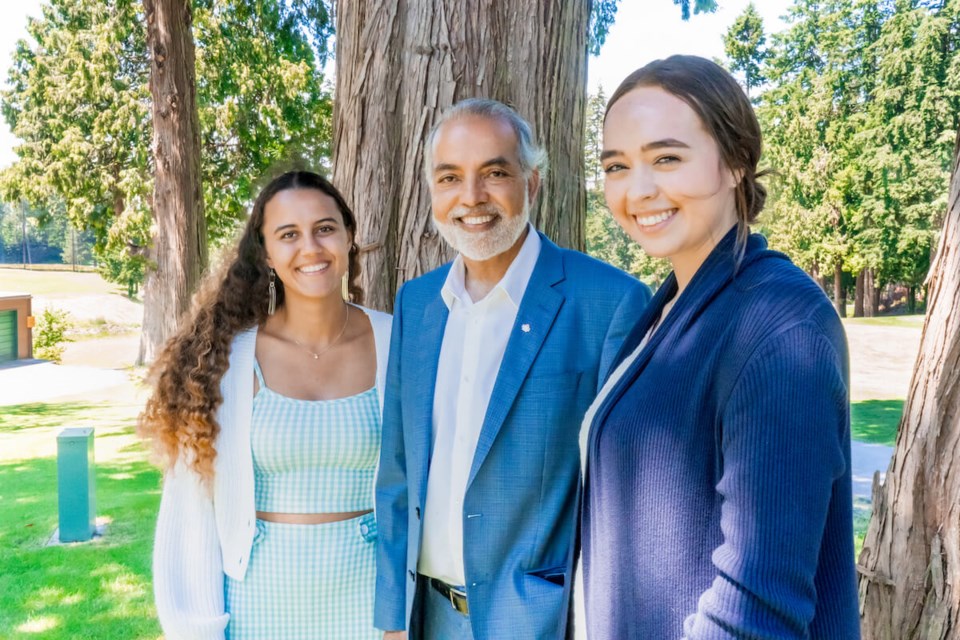A Richmond businessman was inspired to start a scholarship for Indigenous students after a racist encounter with a cab driver.
Back in 2016, when Barj Dhahan told the driver he had just returned from a trip up north to a First Nations community, his driver asked him if he spoke Punjabi.
"He kind of retorted at some point... that these people are all lazy, and they're drunks," recalled Dhahan. "I was just so taken aback by it."
After chatting with the driver and challenging him on his views, Dhahan felt the need to do something.
A scholarship was a natural choice for Dhahan, as the UBC alumnus is a firm believer in the importance of access to education.
He had also set up the Canada India Education Society with his friends and family back in 1991, which aims to support and create educational and healthcare opportunities for marginalized people in India and Canada.
"I had been speaking with the University of British Columbia and a number of other universities. What was startling is there are many barriers to Indigenous students. There's a myth that everything is given to them. That's not true," he said.
The timing was perfect, too, as it was UBC's centennial year. And so a $400,000 scholarship called "Honouring the Truth, Centennial Scholars Major Entrance Award for Aboriginal Students" was created with funding from Dhahan and other alumni and parents.
The scholarship offers $5,000 to first-year recipients, and it can be renewed for three more years or until they finish their undergraduate studies. To qualify for the scholarship, applicants need to self-identify as Indigenous.
This aspect was important for biochemistry major Anita Rodrigues, who is one of the 20 recipients who have benefited from the scholarship since it launched in 2016.
Rodrigues has First Nations blood on her paternal side, including her grandmother, who was part of the Squamish nation and her great-grandfather, a residential school survivor.
However, she does not have documents to indicate her Indigeneity, which was required for most scholarships catered to Indigenous students.
Being a recipient of Dhahan's scholarship, which recognized her heritage, allowed Rodrigues to gain confidence in her Indigenous identity.
“I’ve always been proud of my ancestry, but I love sharing it now,” she said.
Visible minorities and immigrants have a role to play
Dhahan hopes that his actions can encourage more Canadians, "regardless of their battle," to get to know First Nations communities. In particular, he thinks that visible minorities and immigrant communities have a role to play in truth and reconciliation.
"I think there's a growing awareness that serious injustices were done to Indigenous peoples, but I don't think collectively [visible minorities] are really engaged in truth and reconciliation," said Dhahan.
He notes the battles that such communities have been fighting to right past injustices, such as the Japanese internment camps during WWII, the Chinese Exclusion Act, and the discrimination against passengers aboard the Komagata Maru steamship.
"If we could get the federal government to address historic wrongs for immigrant communities, then those same immigrant communities need to work with First Nations and put pressure on the government.
"Let's move this thing faster than what we're doing right now," he said.
Dhahan thinks that one thing community members can do is form friendships and relationships with First Nations groups. And the same goes for community organizations.
"There is no one way. Everybody has to figure out their own way of how they as individuals are going to engage. And then how community organizations engage," he said.
And it should be a partnership.
"I think it's about extending ourselves and partnering with (Indigenous communities)...
"What will work is when we come along as human beings with our own traditions, our own background, and say, 'I want to learn. I want to support. Please tell me how you would like me to help.'"




